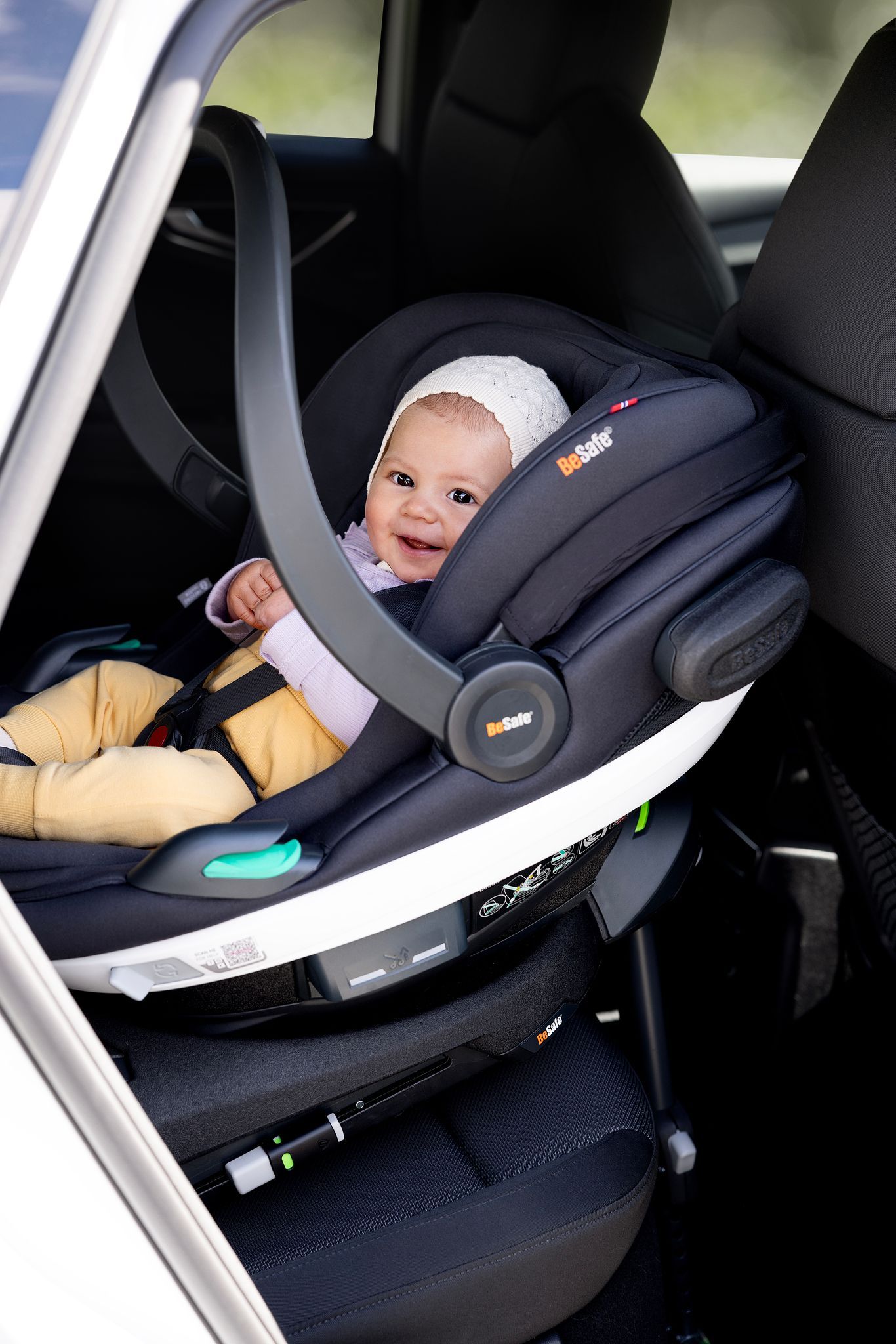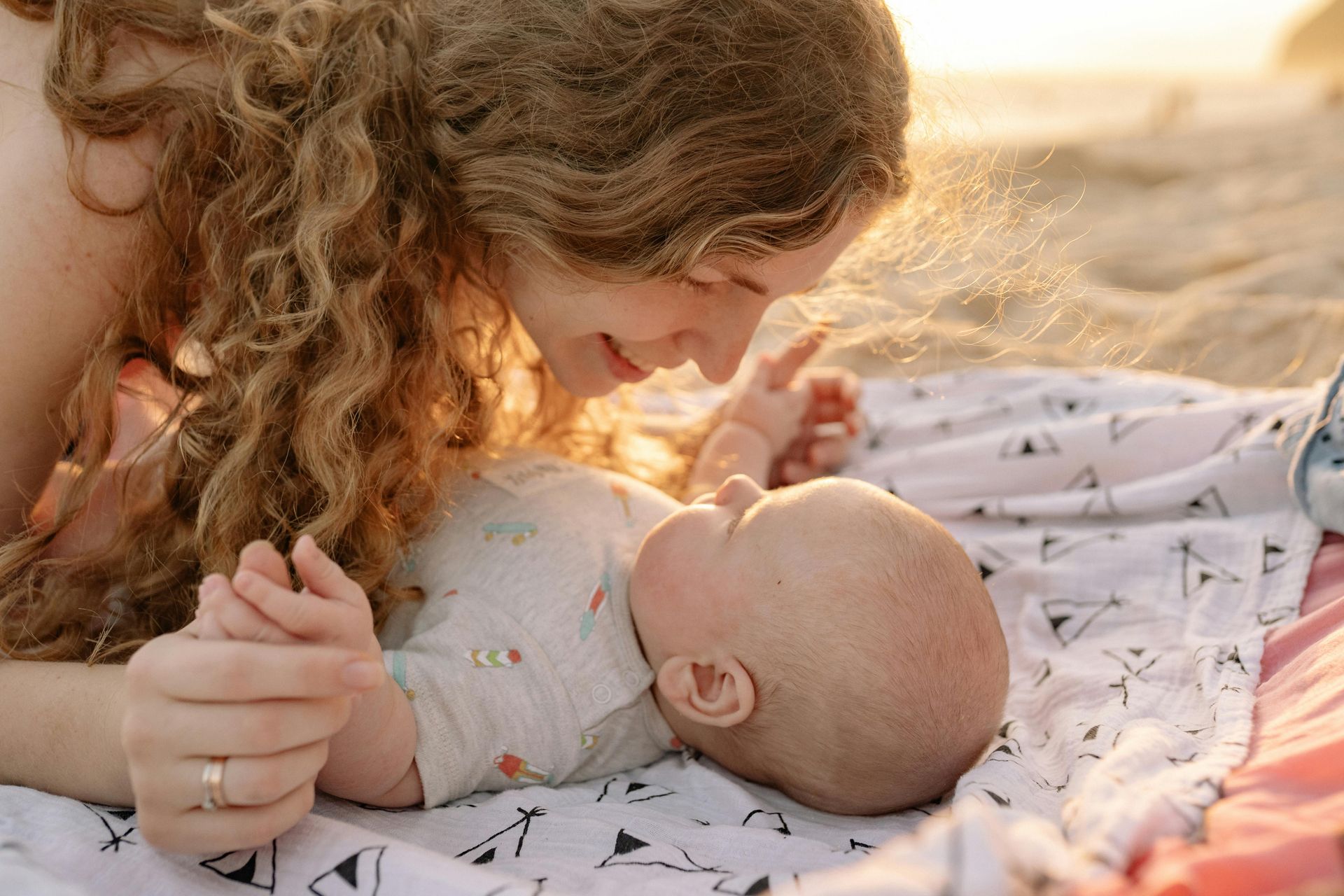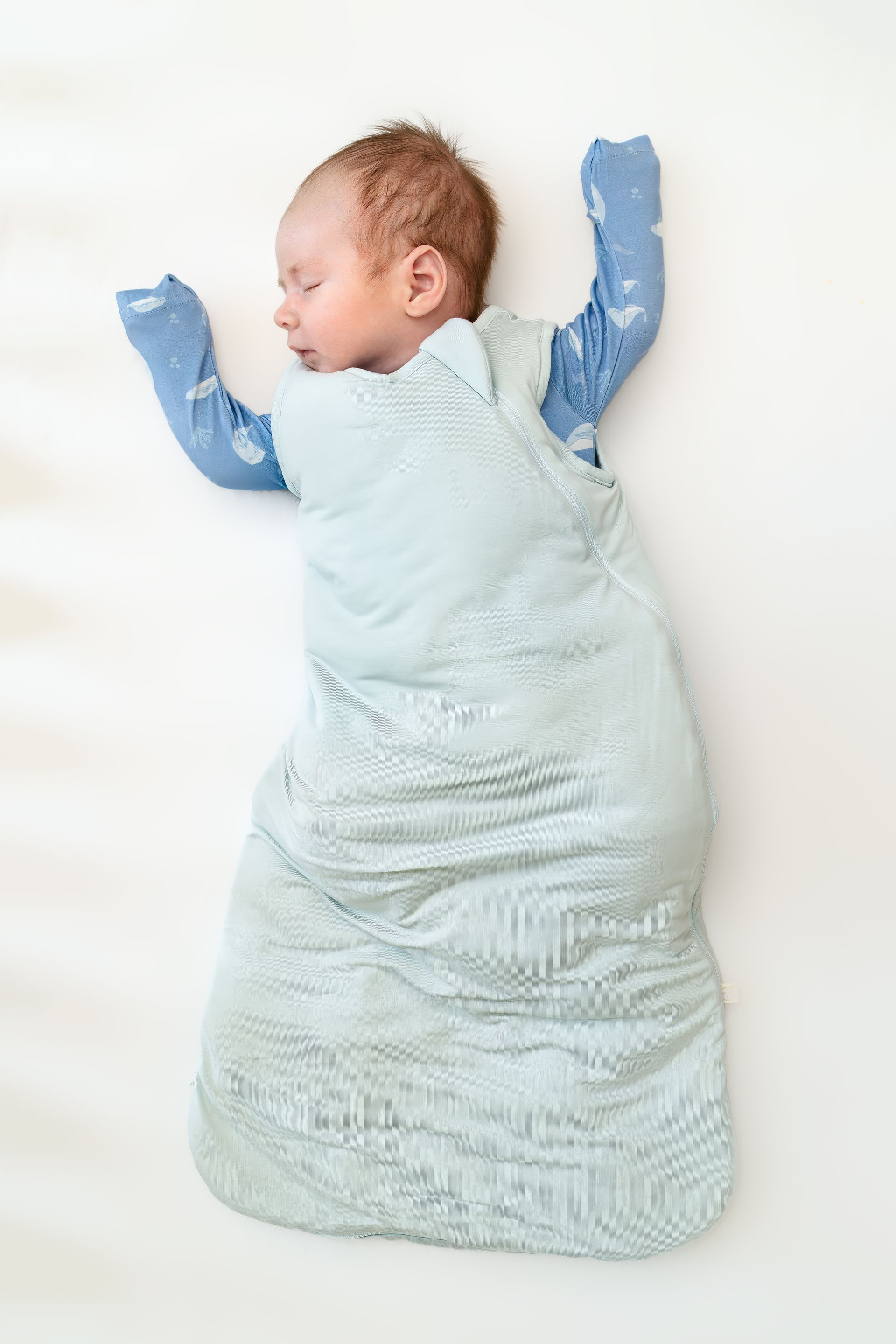Managing Your Child’s Separation Anxiety
lbenjell • September 19, 2022
As a new mom, one of the hardest things you’ll ever do is leave your baby for the first time. Whether you’re going out with your friends, returning to work after maternity leave, or just taking a trip to the grocery store alone, leaving your baby with someone else (even if it’s another amazing caregiver) can be a challenge.
But eventually, leaving will become easier.
For you, at least.
As your baby becomes more aware and develops object permanence, it’s very common for them to experience separation anxiety. All parents go through this at some point – even I did!
I remember having to sneak out of the room with my first born…as he was busy doing something else, I’d quickly walk out to prevent any meltdowns that would come if I left when he was paying attention to me. But I quickly realized sneaking out of the room wasn't the best strategy.
If you find yourself in this season of separation anxiety, I want you to know two things.
One, it won’t last forever. In time, your child will begin to understand that when you leave, you’ll come back.
Two, there are tips to help you manage if your child is experiencing a lot of anxiety when you leave them. And that, my friends, is what we’ll focus on in this post.
What is Separation Anxiety?
Separation anxiety is exactly what it sounds like: feelings of anxiety when you’re separated from someone or something.
For many babies, separation anxiety is noticed when mom or dad leaves the room, leaves the house for work, or drops them off at daycare.
Separation anxiety doesn’t just pop in at certain times. Rather, it ebbs and flows in the first couple years. When your baby is little, they don’t understand that you’ll be coming back when you leave their sight. In their minds, you’re gone forever.
Because of this, it can cause tears, protests, or clinginess.
Of course, separation anxiety can present itself in different ways, but if you notice a change in your child’s behavior when you leave their presence, it’s likely that they’re experiencing some form of separation anxiety.
Start Small and Practice
If you have a little one who is dealing with separation anxiety, it can be hard to determine the best strategy. Do you try to leave when they aren’t paying attention, or do you stick to it and walk out the door, even if they are crying and chasing after you?
Many parents worry and think that they won’t be able to leave their baby who is stuck to their hip. But you can train your baby in this area, just as you do with sleep, by starting small.
- From the start, whenever you leave, stress to your child that mommy will be back. You can even make it fun and sing Daniel Tiger’s “Grown Ups Come Back” song to help them learn that you’re not leaving them forever!
- Play peek-a-boo with your child to show them that when things or people disappear, they are still there. You can do this with their toys by hiding them behind a pillow or a book, or you can play with them by hiding behind the couch or leaving the room and popping back in.
As you play with your baby, you can gradually extend how long you are “hidden.” Maybe when you first start playing, you’re only gone for 3 seconds. But as your child understands that you’re not gone forever, you can stay out of the room for longer periods of time.
Leaving the House When Your Baby is Clingy
Another important element of helping your little one with their separation anxiety is to create a goodbye routine that you can practice each time you leave your child’s presence.
A great goodbye routine consists of two things: it’s short and it’s consistent.
You don’t want to have a long, drawn-out goodbye routine, as that can further upset your baby. Instead, keep it short and sweet. Tell your little one that you’ll be back, and stay confident. Your baby will pick up on any anxiety you have, and it will only feed into theirs.
Then, when you do return home, tell your child, “Mommy was gone, and she came back!” to further prove that *cue Daniel Tiger* grown ups come back.
Whatever the routine looks like, it’s important to keep it consistent. Every time you leave, make sure you do the same things. Give your little one a hug, kiss them goodbye, and tell them you’ll be back soon. If you sneak out on your baby one day, they won’t trust that you’ll actually come back when you leave.
Separation Anxiety and Bedtime
Just as your child thinks you won’t come back when you walk out the door, it’s the same with their sleep. Your child is separated from you for a while throughout the night, and this can make bedtime difficult.
All the more reason to stick to your routine and reassure them that you will come back in the morning.
With practice, your baby will soon understand that leaving is normal, and they will trust that you will return.
One of the best ways to help your child manage separation anxiety is by creating a consistent routine, which includes the bedtime routine. If you currently don’t have a bedtime routine, or it varies each night, I encourage you to check out this blog post
to help you get started.
I know separation anxiety can be hard to manage, but by taking small steps each day and staying consistent, your little one will grow in their trust and understanding in no time!

Choosing a car seat is one of the most important decisions you’ll make as a parent. It’s not just about convenience — it’s about giving your child the best protection on every journey . In the UAE, where we drive long distances, face busy roads, and deal with extreme heat, the right car seat matters more than ever. But with so many options, how do you know which one to choose? Here are our top 4 tips to make car seat shopping easier — and safer. 1. PRIORITIZE SEATS THAT UNDERGO THE TOUGHEST CRASH TESTING Not all car seats are created equal. Many parents think if a seat is “legal,” it must be safe — but that’s not always true. ECE R44 : The most basic standard, now phased out in Europe. ECE R129 (i-Size) : Stricter testing with better head, neck, and side-impact protection. The Swedish Plus Test : The toughest crash test in the world — and the gold standard. What makes the Swedish Plus Test so important? It’s the only test that measures neck forces on a child’s body in a crash. Seats that pass prove they can keep neck loads below dangerous limits — a key factor in preventing serious injury. Many car seats fail completely under this extreme test, which shows just how high the bar is. 👉 If a car seat has passed the Swedish Plus Test , you can be confident it offers the highest level of safety for your child. 💡 Remember: Legal does not always mean safe . Go beyond the minimum. 2. CONSIDER YOUR CHILD'S HEIGHT, WEIGHT, AND AGE — EVEN THE SMALLEST ONES Every child grows differently, and size matters when it comes to safety. Preemies and smaller babies : Standard carriers often don’t provide the right fit. They need extra support for the head, neck, and body, plus proper harness positioning. Twins or multiples : Planning seating for two (or more) at once requires careful choice so every child gets the safest setup. As children grow, their height and weight percentiles determine how long a seat will last. We recommend car seats with at least a 25kg weight limit and 125cm height limit , which allow for extended rear-facing travel . Why rear-facing ? Research shows it is up to 5 times safer than forward-facing for children up to 6–7 years old. Better crash force distribution across the strongest part of the body. Superior head and neck protection , preventing the whip-forward motion that can cause spinal injury. Cocoon-like shell protection against front and side impacts. 💡 Bonus for UAE parents: The BeSafe Go Beyond with Preemie Inlay was designed with neonatal nurses to support even the tiniest babies. It features a removable wedge for better harness fit and breathable mesh fabric — keeping your baby safe and cool in our hot weather. 3. MATCH THE CAR SEAT TO YOUR CAR AND LIFESTYLE Your car seat needs to fit not just your car — but your daily routine . Multiple cars? Choose a seat that’s easy to install/uninstall. Growing family? Invest in a seat with a long lifespan that can be passed down. Seat placement? Consider if it will go behind the passenger, in the middle, or side by side with another child seat. Bigger families? Narrow but safe seats can fit 3-across or work well in 7-seaters, without compromising protection. Example from our family setup: Mummy’s car : BeSafe Flex Fix 2 for Sofia (8y) + BeSafe Stretch for Leo (5y). Daddy’s car: Axkid One3 for Leo + BeSafe Flex Fix 2 for Sofia. The Axkid One3 was chosen because Daddy often removes the seat, and installation takes under 30 seconds . 👉 Key takeaway: The “best seat” isn’t the one your friend uses — it’s the one that fits your child, your car, and your lifestyle . 4. DON'T COMPROMISE — BUY FROM A CHILD CAR SEAT SPECIALIST Buying from a specialized retailer ensures peace of mind: They recommend a seat that fits your child, car, and routine . They install it correctly and show you how. If the seat doesn’t fit, they won’t install it — and they’ll help you find one that does. They’ll reinstall it whenever you need , for example when changing cars, at no extra cost. At Safety On Board , we offer 1-1 car seat consultation and hands-on support to make sure your child rides safely every time. FINAL THOUGHTS A car seat isn’t just another baby item — it’s life-saving equipment. Whether you’re bringing home a preemie, juggling twins, or moving a big kid into a booster, the right seat + the right suppor t makes all the difference. If you’re unsure where to start, contact us and book a consultation with us. We’ll help you find the perfect fit for your child, your car, and your family. Because every child in the UAE deserves the safest ride 💛 Sophie Huang is the founder of Safety on Board , the UAE’s first child car seat specialist. She is also a mom of 2 and an internationally certified car seat expert . With a passion for keeping children as safe as possbile on UAE road, she guides parents in choosing and installing the safest car seats. Sophie believes safety can be simple, stress-free, and empowering for every parent.

There’s something magical about a beach holiday — the sound of waves, salty air, and the promise of slow days in the sun. But let’s be honest: traveling to the beach with a baby isn’t exactly a vacation unless sleep is part of the equation. Whether you're heading to a resort, renting a seaside villa, or visiting family by the coast, here’s how to set your baby up for restful sleep — so everyone gets to enjoy that ocean breeze. Step 1: Know That Sleep Needs Don’t Take a Holiday Babies are creatures of habit. Their little bodies thrive on rhythm and predictability — even on vacation. But that doesn’t mean you can’t have fun or go with the flow! It just means that your baby’s sleep needs are still there, and the better prepared you are, the easier it will be to keep things (mostly) on track. Step 2: Your Beach Baby Sleep Packing List Here’s your ultimate baby sleep packing list for a beach trip, broken down by category: Sleep Environment Essentials : Portable travel crib or bassinet – Choose one your baby is already familiar with if possible. Fitted sheets – Bring 2-3 just in case of sand, spills or spit-up. Also bring a gently used one to remind baby of home as he/she adjusts to the new sleep environment. Portable blackout blinds – Beach homes and rentals often have light, sheer curtains. White noise machine or app – Helps block out unfamiliar sounds like waves (yes, they can be loud!) or street noise. Baby monitor (if you’ll be in a larger space or stepping outside during naps). For more on the ideal sleep environment, have a read here . Comfort + Routine : Lovey or comfort object (if age-appropriate and safe for sleep). Sleep sack – Choose a breathable, summer-weight one. Favorite bedtime book – Familiarity brings comfort. Pacifiers – Always bring extras! Nightlight – A soft, warm one if needed for feeds or changes during the night. Weather + Climate Considerations : Lightweight, breathable pajamas – Think cotton or bamboo Fan – If your rental lacks good airflow or AC Bonus Tip: Have a “Nap-on-the-Go” Kit **For beach days that cut into nap time: Clip-on stroller fan Stroller or baby carrier your baby can sleep in Portable white noise machine Extra sun hats + baby-safe sunscreen (for after 6 months old) Step 3: Keep the Routine (Even on the Coast) Try to mirror your bedtime routine as closely as you can. If you usually do bath → PJs → book → feed → sleep, stick with it — even if it’s a quick version. Babies love the predictability, and it helps signal that it’s time to wind down, even in a new environment. Also, aim for naps in a darkened room when possible, especially after a stimulating beach outing. And if one nap has to happen in the stroller under a palm tree? That’s totally okay. Just go back to the routine as soon as you can. Getting There: Travel Day Tips Time your departure around naps if possible Use familiar sleep items (like the sleep sack or pacifier) during flights or drives Offer extra feeds — travel is dehydrating, especially in hot weather Keep expectations flexible – sleep may not be perfect, and that’s fine Beach trips with a baby can be full of joyful memories and restful nights — as long as you plan for sleep. With the right gear and mindset, your little one can stay well-rested and content, giving you more time to soak up the sun (or at least drink your coffee while it’s still warm!). And remember: sleep doesn’t have to fall apart just because you’re away from home. If you ever feel stuck or unsure about how to adjust things before, during, or after a trip, I’m here to help you build a personalized plan that fits your family’s travel style. Book your discovery call here .

October is SIDS Awareness Month, dedicated to raising awareness about Sudden Infant Death Syndrome. It’s a time to educate parents and caregivers on safe sleep practices that can reduce the risk and help protect our little ones.. At Hushabye, safety is at the heart of our brand. Our focus is on providing parents with safe and high-quality baby sleepwear, such as sleep bags, that offer a safer alternative to traditional blankets. What is a baby sleep bag? A baby sleep bag, also known as a wearable blanket or sleep sack, is a specially designed garment for infants and young children to wear during sleep. The primary purpose of a sleep bag is to keep the baby warm and comfortable, but it also serves as a safe and convenient alternative to traditional blankets and quilts in a crib or cot.


